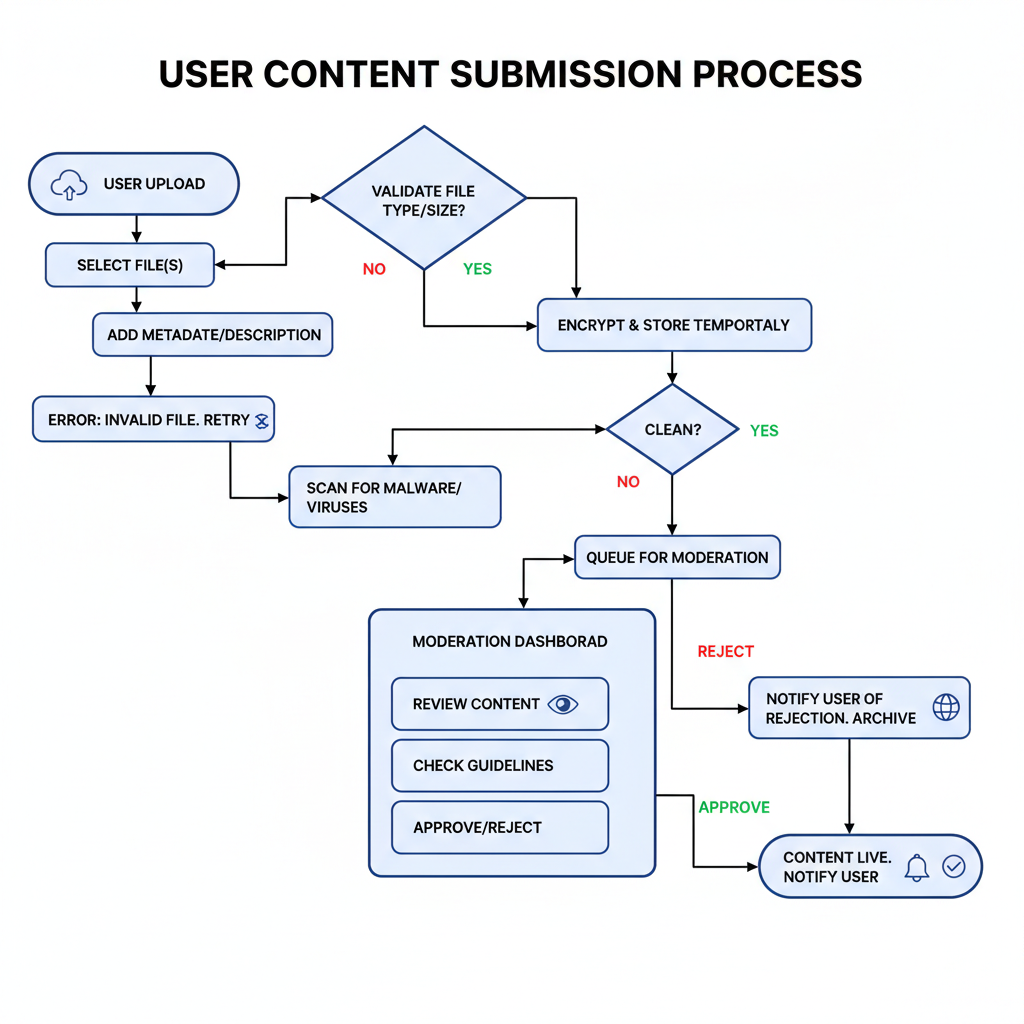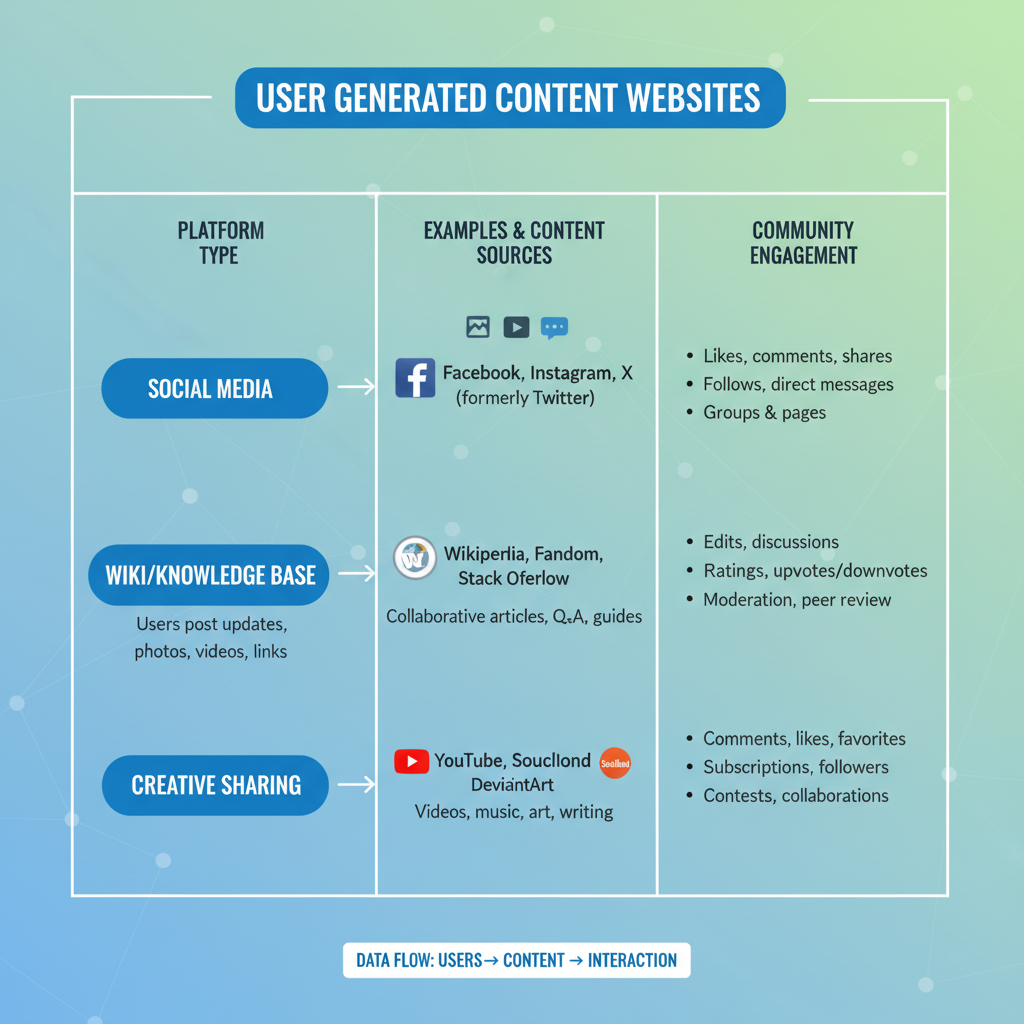Guide to Building Successful User Generated Websites
Learn how to build, optimize, and monetize user generated websites with niche targeting, tech stack selection, moderation, and gamification tactics.

Introduction to User Generated Websites
User generated websites are dynamic online platforms where most content is created and shared by the community rather than by administrators. This user-generated content (UGC) model drives engagement, fuels organic growth, and can establish strong brand loyalty when managed correctly. In this guide, we’ll explore how to build, optimize, and monetize user generated websites—from defining your niche to scaling with the right technology and strategies.

---
Understanding User Generated Websites
User generated websites create an online ecosystem for users to submit, rate, comment, and collaborate on content. The collaborative nature makes them powerful engines for content diversity and authenticity.
Popular examples include:
- Reddit – A network of forums where registered users post text, links, and media.
- YouTube – A global video-sharing platform powered entirely by creators.
- TripAdvisor – Crowdsourced travel reviews and recommendations.
- Medium – A blogging and storytelling platform open to diverse contributors.
The success of such websites often depends on a strong community foundation, streamlined contribution processes, and sustainable moderation policies.
---
Identifying Your Niche and Target Audience
Before starting development, decide exactly which niche your platform will serve. A precise target audience enhances engagement and simplifies marketing.
Steps to Define Your Niche
- Research market gaps to find underserved communities.
- Understand audience needs through surveys, interviews, and competitor analysis.
- Focus on a vertical such as hobbies, professions, travel, food, or tech.
Clear audience targeting influences platform features, branding, and monetization opportunities.
---
Choosing the Right Tech Stack and CMS
The technology you choose for your user generated website impacts scalability, performance, and feature flexibility.
Factors to Consider
- Scalability to accommodate high traffic.
- Flexibility for integrating APIs or adding custom functions.
- Usability for non-technical admins.
| Category | Examples | Pros | Cons |
|---|---|---|---|
| Framework | React, Vue, Next.js | Modern, component-based, fast | Requires JavaScript expertise |
| CMS | WordPress + plugins, Drupal | Easy to set up, lots of plugins | Potential bloat and slower performance |
| Backend | Node.js, Django, Laravel | Robust ecosystems | May require more dev resources |
| Database | PostgreSQL, MongoDB | Scalable, diverse schemas | Complex management at scale |
For rapid deployment, WordPress with UGC plugins is a common choice; for more control, integrate a JavaScript frontend with a Python or PHP backend.
---
Designing Submission and Moderation Workflows
Smooth submission flows encourage participation, while strong moderation safeguards quality.

Submission Workflow Best Practices
- Minimize friction by reducing required fields.
- Provide guidance with examples and tooltips.
- Include preview options so users can check their contributions.
Moderation Essentials
- Tiered permissions for trusted moderators.
- Flagging systems for community-based reporting.
- Automated detection for spam or offensive content.
Early investment in moderation tools preserves community trust and content integrity.
---
Implementing Gamification and Incentives
Gamification turns passive users into active contributors by rewarding engagement.
Effective Methods
- Badges & Achievements for milestones.
- Points & Leaderboards to spark friendly competition.
- Exclusive perks such as early content access.
Align rewards with community goals to avoid incentivizing low-quality posts.
---
Optimizing SEO for User Generated Websites
SEO is vital for UGC platforms because it drives sustainable traffic. Proper structure ensures that search engines index your site effectively.
SEO Checklist
- Schema markup for structured data.
- Clean URLs with descriptive keywords.
- Smart tagging systems for better categorization.
- Internal linking to related content.
- Mobile optimization for faster loading.
Autocomplete tag suggestions can help users choose relevant keywords, boosting discoverability and ranking performance.
---
Maintaining Quality and Safety Through Moderation
Strong moderation builds trust and ensures long-term engagement.
Strategies
- Publish clear guidelines and enforce them.
- Encourage proactive moderator engagement in discussions.
- Offer transparency by explaining moderation decisions.
Multiple layers of moderation—from automated filters to peer reviews—help maintain consistent quality.
---
Leveraging Social Sharing and Referrals
Social channels can dramatically increase visibility for user generated websites.

Growth Tactics
- One-click sharing on popular social media.
- Referral rewards to motivate organic promotion.
- Feature top user contributions in newsletters or feeds.
Design rewards to inspire meaningful activity rather than simply gathering sign-ups.
---
Measuring Engagement and Iterating
Data analysis is crucial for platform growth.
Metrics to Monitor
- Ratio of active contributors to viewers.
- Submission-to-approval rates.
- Average session duration and bounce rates.
- Social share frequency per post.
Use metrics insights to run A/B tests, refine workflows, and enhance the user experience.
---
Monetization Models That Build Trust
Revenue strategies for user generated websites must enhance—not harm—the community.
Options
- Advertising with non-intrusive formats.
- Premium memberships offering exclusive benefits.
- Affiliate links relevant to content.
- Merchandise featuring community branding.
Avoid aggressive tactics that may alienate valuable contributors.
---
Summary and Next Steps
Creating a successful user generated website involves balancing technology, community engagement, and business models. By:
- Defining your niche,
- Selecting the right technology stack,
- Building smooth workflows with strong moderation,
- Leveraging SEO and social sharing, and
- Monetizing responsibly,
you can develop a thriving, sustainable platform.
Ready to start building your own user generated website? Begin with niche research and workflow design, and set the stage for a vibrant online community.



